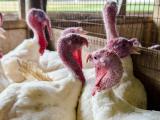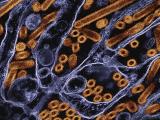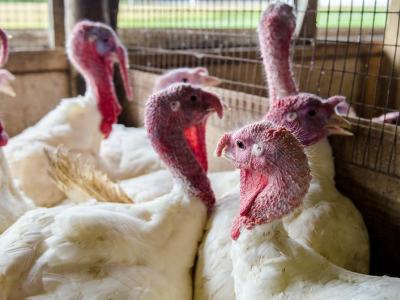Nov 21, 2005 (CIDRAP News) – Preliminary tests indicate H5N1 avian influenza caused the death of a 35-year-old Indonesian man in Jakarta on Nov 19, according to a government official quoted today in the Jakarta Post.
However, Indonesia is awaiting confirmation from a World Health Organization (WHO) reference laboratory of what would be the country's eighth fatality from avian flu. WHO has already confirmed 11 cases, seven of them fatal, in Indonesia.
Elsewhere in Southeast Asia and Europe, governments continued to push for changes in reporting and response to avian flu as the virus spreads among poultry.
China pushes pace of reporting
Local governments in China have been ordered to report avian flu outbreaks, as well as outbreaks of other zoonotic diseases, to national authorities within 4 hours, according to a Bloomberg News report.
Officials who fail to comply can be fined US $247 and be demoted or fired, according to the story, which cites an announcement yesterday by Xinhua, China's official news agency.
Even as the announcement was made public, China logged two new outbreaks of the virus, Bloomberg reported today. Morin Dawa County in Inner Mongolia had 176 bird deaths on Nov 15, according to a separate Bloomberg report. About 3,500 geese died the next day in Shishou City in the central province of Hubei. The H5N1 infection was confirmed by China's National Avian Flu Reference Laboratory.
Those outbreaks bring the total number of outbreaks in China this year to 21, Vice Agriculture Minister Yin Chengjie told Bloomberg News. The outbreaks have killed 144,624 poultry and prompted the culling of 21.2 million to contain the disease.
The Associated Press reported today that Yin said there was an "increasing virulence of avian influenza," as demonstrated by an increase in H5N1 illness in ducks and geese.
Hong Kong promotes hygiene
Hong Kong enlisted public help yesterday for a widespread hygiene education effort aimed at preventing avian and pandemic flu.
The 3-month effort began with yesterday's "Community Cleanliness Day," according to a news release from the Hong Kong government. The effort will include more than 230 community cleansing and hygiene programs with health seminars, roaming exhibits, bus parades, and home cleaning for the elderly. More than 80,000 people are expected to participate.
Vietnamese official warns local authorities
Avian flu could become a national disaster in Vietnam, Prime Minister Phan Van Khai warned yesterday in an Agence France-Presse (AFP) story.
"The risk of a human pandemic would be very high if avian influenza is not checked in a timely manner in the country," he said. "The epidemic [among poultry] is continuing to break out and become more and more serious." He threatened to discipline officials who manage the problem poorly.
"There has been a tardiness and an inefficiency in the fight against bird flu in several localities," he added.
Despite the vaccination of about 220 million poultry in Vietnam since September, the death toll continues to rise, AFP reported. About 1 million poultry have died or been culled because of H5N1 since October.
Thai fighting birds to re-enter ring in 2006
Thailand, which had banned cockfighting to help prevent avian flu, is preparing to permit the popular sport again in 2006. But this time measures will be taken to prevent the spread of H5N1 virus among birds or to people, authorities said in an online report Nov 19 from the Thai news agency MCOT.
Officials will meet with breeders to agree on guidelines to allow the fights to occur. The birds must be registered and pass a health check before competing, said Khun Ying Sudarat Keyuraphan, the agriculture and cooperatives minister, on Nov 19. She said only about 40,000 of Thailand's 1 million fighting cocks had been registered so far.
An 18-year-old Thai man contracted a fatal H5N1 infection and died in September 2004 after using his mouth to clear mucous from the beak of one of his fighting birds.
Romania confirms outbreak of H5N1
A British laboratory has confirmed that Romanian hens found dead last week in Caraorman in the Danube River delta were infected with H5N1, Reuters reported today.
The dead birds were found Nov 14, leading to the culling of about 2,000 birds and a quarantine of the village.
Avian flu was also found in wild birds not far from the village, Reuters reported. Those samples will also be tested in London.
Follow-up tests in Maliuc, where H5N1 was detected in October, were negative, the Romanian agriculture ministry reported, according to Reuters. Restrictions on the village have been lifted.
Japanese outbreak H5N2, not H5N1
Japan has confirmed that an avian flu outbreak on a farm in Ibaraki prefecture is not H5N1, but rather a low-pathogenic version of H5N2, according to a report filed with the World Organization for Animal Health (OIE). Laboratory tests have confirmed that the outbreak, which began Nov 4, was H5N2. Those findings are consistent with speculation in published reports at the beginning of the outbreak; Ibaraki prefecture has seen H5N2 outbreaks since last June.


















